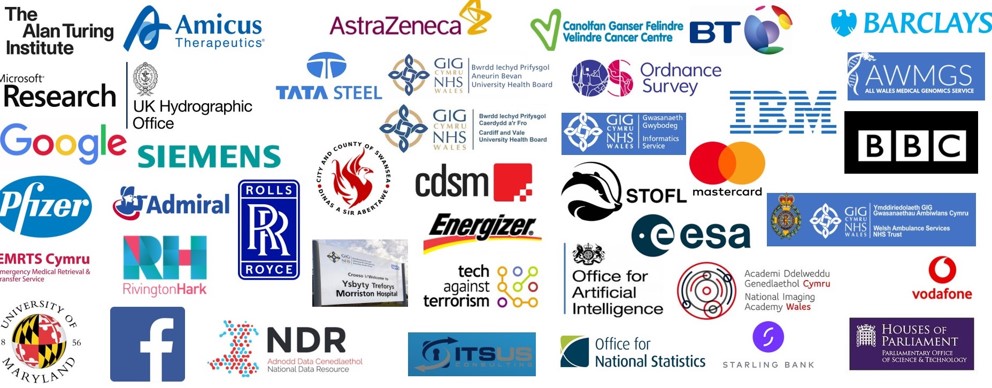Key stakeholders
The vision for the Centre has been shaped by engaging with stakeholders that we have deep long-term research relationships with, in addition to embracing views of new collaborators. There is significant engagement in the vision for the Centre from traditional industries (e.g., Tata Steel) to emerging digital economy startups (e.g., Traydstream, Vortex IoT, GeoLang); from the security sector (e.g., QinetiQ, McAfee) and the legal profession (e.g., Mishcon de Reya, Wavelength Law) to leading research institutes in global Universities (e.g., IIT Bombay; Texas A&M; University of Maryland; Rice University; Yonsei University).
Engaging With Key Stakeholders
Our partners and stakeholders present three opportunity clusters for PhD students:
- Challenging Contexts. We have partners that are engaged with data-driven and intelligence-based systems in each of the challenge areas identified early. For example, NHS & Pfizer (in Health and Well-Being); Tata Steel & Ford (in Smart Manufacturing); DST Innovations (in Energy); Admiral Group & Ordnance Survey (in Economic Acceleration through the Digital Economy); and, Mischon de Reya & McAfee (cross-cutting).
- Technology Leadership. This cluster comprises organisations with technological and scientific interests in AI and big data that span the range of challenge contexts represented in the Centre and include: Vortex IoT; Fujitsu; GoFore; Microsoft Research; Google; the Digital Economy Catapult; and, the Alan Turing Institute (who will host students as visiting researchers).
- Ethical and Societal Perspectives. While many of these organisations have substantial and growing interests in developing AI and big data systems with an ethical and responsible imperative, we also have partners and stakeholders for whom these aspects are a core part of their work and who will further encourage cohorts to carry out their science and innovation with careful, societally grounded flair. Each has been involved in shaping the Centre These include the Worshipful Company of Information Technologists’ Ethical and Spiritual Development Panel; the Centre for Computing and Social Responsibility; the Open Innovation Team at the Cabinet Office; and, the Observatory for Responsible Research in ICT (ORBIT).
Centre Partners, Stakeholders and Associates
Stakeholder Testimonials
“We have had an excellent engagement with the Business leads and the academic leadership team at the Centre. We have had some really constructive discussions around Rolls-Royce requirements and how the Computational Foundry can help which has resulted in us planning projects that are outside my initial intention of driving collaboration between Swansea Materials & Computational Foundry.”
Ben Saunders, Team Leader – Materials & Process Modelling, Rolls-Royce
“The Centre strikes a good balance between machine learning and AI, but also has the human element at the Centre of the research. Our collaboration experience so far has been superb. The University has demonstrated flexibility and enthusiasm for our projects and we have matched some high calibre students to the projects. The support from the University in this aspect has been excellent.”
Mark Casey, Head of Research, Design & Innovation, UK Hydrographic Office
“We really value the human-computer interface focus of the centre. Our involvement with the centre has been excellent - a true collaborative feel. We have been very impressed by the attitude, experience and expertise of the centre’s academics and students.”
Laura Clark, NHS Value & Partnership Manager, and Dan Franks, Medical Director UK & Ireland, Amicus Therapeutics
“We engaged with the Centre as we believe it’s important to assist local universities to continue to lead and develop their respective disciplines. We also felt that the Centre’s collaborative approach was strongly aligned with Admiral’s culture and could really offer value to our business. Our collaboration experience so far has been great.”
Paul Taylor, Head of Telematics – Admiral Group Plc
“It’s been a rewarding and informative experience being fully engaged with the Centre from attending launch day, recruiting students, briefing students the issues facing Tata Steel to co-creating new project briefs with the academics, and interviewing students for the projects. The Centre aims to use human interfaces with machine learning in order to bring out the best of both humans and computers.”
Simon Lewis, Section Manager SIS/TLR, Through Process Quality – Technical, Tata Steel
“Following our introduction, we were able to attend a sandpit event and developed a working relationship from there. Once engaged with the Centre, we found that their vision aligned with that of our own organisation. So far we are extremely impressed with the Centre’s vision, and its desire to apply technologies to real-world problems. Meeting with students early on ensured that there is a buy-in from both sides, and the selection process was extremely efficient and well run.”
David Lockey, National Director; David Rawlinson, Clinical Informatics & Research Manager - Emergency Medical Retrieval and Transfer Service Cymru (EMRTS Cymru)

